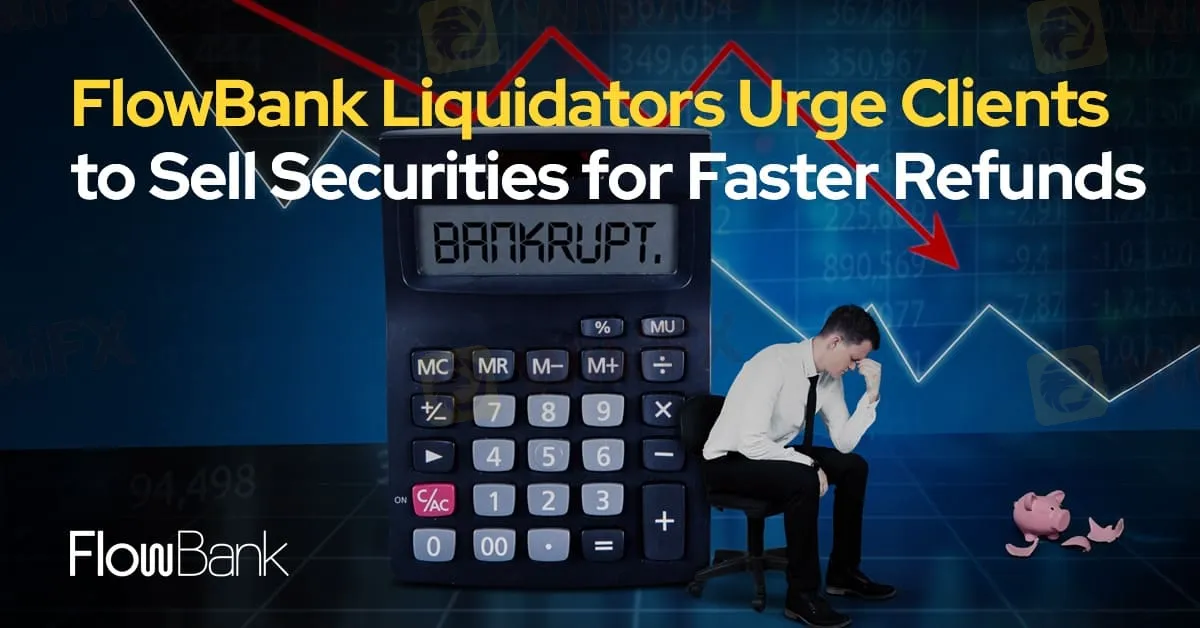简体中文
繁體中文
English
Pусский
日本語
ภาษาไทย
Tiếng Việt
Bahasa Indonesia
Español
हिन्दी
Filippiiniläinen
Français
Deutsch
Português
Türkçe
한국어
العربية
FlowBank Liquidators Urge Clients to Sell Securities for Faster Refunds
Abstract:Walder Wyss, the Swiss law firm overseeing the liquidation of bankrupt neobank FlowBank, has encouraged former clients to sell their securities held in accounts to expedite the refund process. Clients are able to log in to the FlowBank platform and complete the sale of their securities until 15th November 2024, after which the platform will no longer facilitate such transactions

Walder Wyss, the Swiss law firm overseeing the liquidation of bankrupt neobank FlowBank, has encouraged former clients to sell their securities held in accounts to expedite the refund process. Clients are able to log in to the FlowBank platform and complete the sale of their securities until 15th November 2024, after which the platform will no longer facilitate such transactions. This initiative aims to simplify the refund procedure and provide quicker access to funds, with the sale of assets seen as more efficient than transferring securities directly to clients.
The liquidators emphasized that direct transfer of securities to clients would involve significant time and cost. In contrast, converting securities to cash is a faster and simpler method, allowing for smoother disbursement of funds. Clients who opt for the sale can expect their refunds to be processed in a timely manner, while those who do not may face additional delays in receiving their assets.

Once a client‘s positions are sold, the resulting cash will be credited to a separate account before being transferred to a bank account designated by the client. The funds will be sent in either EUR or CHF, depending on the client's choice, and Walder Wyss indicated that these transfers will typically occur within a few days of the sale. However, during the first two weeks of the platform’s launch, manual or automated securities transfers will not be available, as the focus will be on completing sales.
FlowBanks downfall came after the Swiss financial regulator FINMA forced the company into bankruptcy in mid-June 2024. FINMA cited concerns that FlowBank had failed to maintain the minimum required capital for its business operations, with signs that the institution was over-indebted. Founded in 2020 by Charles-Henri Sabet, the company initially focused on providing banking and investment services before shifting its attention toward promoting online CFD trading, similar to Sabet's previous venture, London Capital Group (LCG).
FlowBank's minority owner, crypto investment company CoinShares, held a 30% stake in the neobank at the time of its collapse. While liquidation efforts continue, the liquidators are actively seeking a buyer for LCG, which remains a key unresolved aspect of the process.
This decisive move by Walder Wyss is seen as crucial for ensuring that FlowBanks clients can recover their assets without unnecessary delays, as the liquidation process progresses. Clients are advised to act promptly and take advantage of the streamlined solution to avoid prolonged waiting periods.

Disclaimer:
The views in this article only represent the author's personal views, and do not constitute investment advice on this platform. This platform does not guarantee the accuracy, completeness and timeliness of the information in the article, and will not be liable for any loss caused by the use of or reliance on the information in the article.
Read more

Forex Candles - What Value Do They Add to Your Trading Experience?
Wondering where you can see the forex price movement information? Easy, it’s all there on forex candles, which demonstrate different market sentiments to help traders make informed decisions. Keep reading to learn more.

Risky Choice? What Traders Should Know About Bold Prime
Risk exists everywhere — even well-known brokers are not exceptions. But they often don’t talk about the risks. Instead, they highlight their strengths and try to attract customers while hiding the potential downsides. However, in this article, you’ll learn about the risks involved with Bold Prime.

Forex vs Stocks - Which Can Generate Maximum Earnings for You?
When looking to build wealth at a faster pace, stocks and forex emerge as two powerful alternatives. But which holds more profit potential? Which of the two is riskier? Find out the answers here.

From Novice to Pro: Why Investors Trust Land Prime?
If you're passionate about forex trading and ready to begin your journey as a trader, this article is worth exploring. It highlights the key features that Land Prime offers to both traders and investors.
WikiFX Broker
Latest News
In middle of Trump's trade war, importers hold more cash and move inventory off the books
Gold Soars Above $3,350 as XAU/USD Rallies on Trade Tensions
What WikiFX Found When It Looked Into Emar Markets
Short or Long Term: Which to Choose for Double-Digit Returns from Gold Investments?
What is Forex Trading Simulator?
MT4 vs MT5 Which Forex Trading Platform Fits Your Needs in 2025?
Switzerland tourism boosted as women's soccer continues record-breaking rise
Meta removes 10 million Facebook profiles in effort to combat spam
Cognition to buy AI startup Windsurf days after Google poached CEO in $2.4 billion licensing deal
Musk's xAI faces European scrutiny over Grok's horrific' antisemitic posts
Currency Calculator


